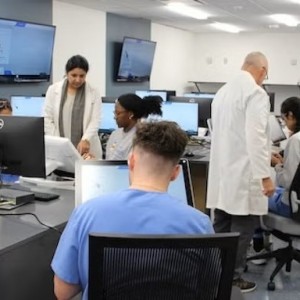
Immunology, Microbiology, and Virology Following Placement of NobelPerfect™ Scalloped Dental Implants: Analysis of a Case Series
Background: Cytokine–microbiology–virology monitoring after implant placement may help to develop profiles of variables that can help to explain interaction between the immune system and alveolar bone. Descriptive information at the molecular and cellular levels after implant placement is important in the emerging field of osteoimmunology and may help to formulate hypotheses and intervention strategies in periodontology and implantology.
Purpose: The purpose of this study was to determine the presence or absence of selected cytokines in association with periodontopathogens and human cytomegalovirus (HCMV) after placement of dental implants.
Materials and Methods: Charts of seven consecutive patients with 19 NobelPerfect™ (Nobel Biocare, Yorba Linda, CA, USA) implants were reviewed for crevicular fluid sample outcomes. Anaerobic culture determined periodontopathogens 2 to 5 days, 3 and 6 months postimplant insertion. At 3, 6, and 12 months, real-time reverse transcriptase–polymerase chain reaction (RT–PCR) was performed to detect active HCMV, interleukin-1beta (IL-1β), tumor necrosis factor-alpha (TNF-α), and interferon-gamma (INF-γ).
Results: Four of five, and six of seven patients harbored no periodontopathogens at 3- or 6-month intervals, respectively. In spite of absence of a bacterial challenge, IL-1β and TNF-α activity was significant. INF-γ was not detected, and HCMV was present at one time interval only.
Conclusions: TNF-α is produced mainly in the early stages of acute inflammation, and high levels of this cytokine at 3 and 6 months postimplant placement may be related to a repetitive acute-phase inflammatory response. Lack of INF-γ and a high cytokine presence without significant corresponding periopathogens or viruses raise a concern that inflammation and, thus, inflammatory bone destruction, is possible outside of these variables. Inflammation and bone loss around this same group of scalloped implants, reported by our previous study, may have been initiated by local factors, such as particular implant design features.
Authors: Hessam Nowzari, Klaus Yi, Winston Chee, Sandra K. Rich
Source: https://onlinelibrary.wiley.com/
 Related articles
Related articles
Periodontology 08 November 2024
Microbiology in Diagnosis and Treatment of Severe Periodontitis. A Report of Four Cases
The purpose of this report is to illustrate the use of microbiology in the diagnosis and treatment in four cases of severe adult periodontitis.
Periodontology 27 June 2025
Bone augmentation procedures to enable dental implant placement are frequently performed in practice.
Periodontology 22 January 2025
The transition from a tooth requiring extraction to its replacement (with a dental implant) requires a series of clinical decisions related to timing, approach, materials, cost-effectiveness and the...
News 04 November 2024
Is Dynamic Navigation the Future of Implant Placement Technology?
Implant dentistry has become the face of modern dentistry for replacing missing teeth. The stability and longevity of implants have revolutionized the industry and allowed dentists to provide better...
Oral pathology 26 June 2024
Although dental implantation is considered to be a safe surgical procedure, this report focuses on a critical hemorrhaging episode associated with implant placement in the first mandibular premolar...
 Read more
Read more
Endodontics 13 January 2026
Regenerative endodontic treatment has provided a treatment option that aims to allow root maturation.
Editorials 13 January 2026
Pitt’s New Digital Dentistry Labs to Provide State-of-the-Art Education and Patient Care
Three new dentistry labs at the University of Pittsburgh School of Dental Medicine will give students and residents hands-on experience with cutting edge digital dental technology while providing...
Products 13 January 2026
Revolutionizing Pediatric Dentistry with Dr. Josh Solomon: SDI Stela & Bioclear Insights
Join pediatric dentist Dr. Josh Solomon as he discusses the cutting-edge SDI Stela self-curing composite system and the Bioclear matrix system, and how these products are transforming Class II...
News 13 January 2026
Curve Dental, the leading cloud-native, all-in-one dental practice management platform, today announced its recognition as a market leader in The 2026 Dental Technology Landscape: Cloud, AI, and the...
News 13 January 2026
Patterson Companies Inc. has announced the appointment of Patrik Eriksson as Patterson Dental’s North American president. Eriksson brings a wealth of experience in the dental and medical technology...














